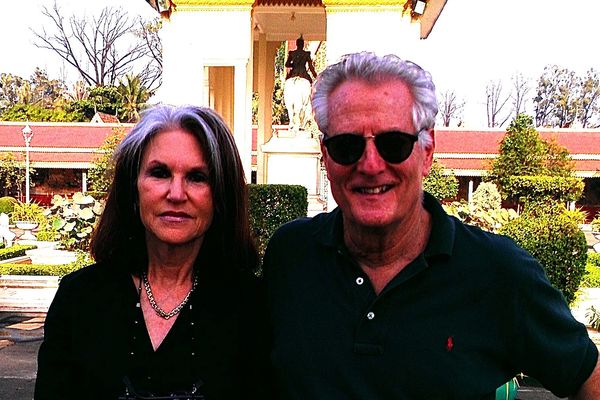Now that we've all had almost a week to settle into the New Year, I find myself at a tug of war with those things called "resolutions." I used to make them until my list got too long. And then I gave up when I'd break them almost as quickly as I'd made them.
But something keeps pulling me back toward what January inspires: the tendency to wipe the slate clean and try, try again. To tackle the New Year as a do-over; a way to make new goals. To figure out a way to do it – whatever “it" is – better.
Dr. Sanjay Gupta, chief medical correspondent at CNN, says that confidence and commitment are key to make New Year's resolutions stick. He says you have to believe that you can change – and have enough willpower to make that change. He also suggests something else that resonates with me: to make the resolutions in February or March, rather than in January, when there is a lot of pressure to make them. I didn't exactly do that, but I waited a few days after January 1 to start thinking about it.
For those of you who didn't make your resolutions, don't make resolutions, or are waiting to think about resolutions, here's my post-New Year's resolutions list for bringing more health into your life. And keep this in mind: persistence counts for something: only 40 percent of people who stick to their number 1 resolution do it on the first try, according to a long-term study at the University of Washington, reports Dr. Gupta. What about the rest? They had to try multiple times. After more than six attempts, 17 percent finally did succeed in reaching their goal.
- Eat Breakfast. People who do are reported to be significantly less likely to be obese and get diabetes when they're compared with non-breakfast eaters. It enhances alertness, attention and performance. Research shows that breakfast eaters consume more vitamins and minerals and less fat and cholesterol; hence a leaner body, lower cholesterol count and a lower chance of overeating later in the day.
You might want to read about my favorite breakfast bread, full of fiber and healthy ingredients: https://healthywomen.org/content/blog-entry/big-mistake-you-dont-want-make
- Get Enough Sleep. Plain and simple: your body – and mind - needs to refuel and recharge. And most of us are not getting enough. Sleep deprivation can play havoc with your health, your memory, performance and learning. If you are sleep-deprived and get behind the wheel (32 million people report they've fallen asleep while driving), it can have serious consequences: according to the National Highway Traffic Safety Administration, each year drowsy driving is responsible for more than 100,000 car crashes, 1,500 deaths and tens of thousands of injuries. Not getting enough sleep can even affect your weight: the hormones leptin and ghrelin (responsible for hunger and fullness), get all out of whack, causing you to eat more than you really need. And since sleep regulates the release of the hormone cortisol, which stimulates cells that boost the immune system, getting enough is important to defend against things like colds and other health-draining illnesses.
If you didn't get enough sleep last night, try carving out 20 minutes for yourself and take a nap. I did that yesterday when I just couldn't keep my eyes open around 3:00 PM and instead of being a grouch the rest of the day, I felt as if I had gotten a full night of sleep.
Why Skimping of Sleep is bad for your health: https://healthywomen.org/content/blog-entry/health-dangers-too-little-sleep
- Add Fish and Omega 3's. If you don't already eat fish, add it to your diet – it's a good source of protein and relatively low in saturated fat. If you already eat it, try eating it at least two times a week. It's a great source of omega-3 fatty acids, which are shown to reduce the risk of heart disease and may help with an overactive immune system (there appears to be a link between omega-3's and a reduction in allergies, asthma, eczema and autoimmune disorders).
Fatty fish like mackerel, lake trout, herring, sardines, albacore tuna and salmon are all rich in omega-3 fatty acids.
Not a fish fan or want alternatives? You can also get your omega-3's in foods like tofu, soybeans, canola oil, walnuts and flaxseed (and their oils).
- Be Good To Your Mouth. Not just with brushing, but with flossing, too – it could add years to your health. How? By keeping the bacteria from dental plaque away from your heart; it can enter your bloodstream and block blood vessels, causing heart disease. A link between oral bacteria and stroke, diabetes and premature birth has also been found by researchers. For more on dental health, click here.
- Create. A hobby - like knitting, drawing, running, playing the piano – can enhance your health by promoting relaxation and happiness and a sense of accomplishment. In a study of patients who had surgery, it was found that the people who were involved in hobbies before their surgeries recovered better compared with people who did not have hobbies. And a hobby can keep you thinner, by burning calories (unless, of course, your hobby is sitting in front of the TV).
Scientists have also found that challenging mental activities such as artistic expression can stimulate the growth of new brain cells in the cerebral cortex.
This Matters> And because emotional and spiritual health guides our physical health, here are some other habits of the emotional and spiritual type worth pursuing:
- Practicing more forgiveness and acceptance
- Worrying less
- Feeling – and showing - more gratitude
- Taking a step back to think before you act
- Cultivating a rich, meaningful social network
- Helping others by volunteering, mentoring, offering emotional support







